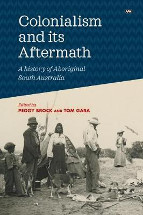Colonialism and its aftermath: A history of Aboriginal South Australia edited by Peggy Brock and Tom Gara

Wakefield Press, 2017. ISBN 9781743054994
(Age: Senior secondary) Highly recommended. This book presents a
series of regional histories of the impact of colonialism on the
Aboriginal peoples of South Australia since 1836, based on the
research of historians, anthropologists, and linguists, and the
lived experience of Aboriginal elders. Each section includes
documentation of colonial history as well as the personal stories
and recollections of Aboriginal people who were impacted by the
spread of white settlers into their lands. People of different
regions fared differently - the Narungga people of Yorke Peninsula
were able to maintain a level of independence negotiating a life
between the Point Pearce Mission and their own lands, despite the
murders committed by pastoralists. People of the far north faced
starvation as land that was once well-grassed was overrun by cattle,
native animals wiped out, and their water sources muddied and
degraded. A repeating story through all the regions is one of
dispossession and violence.
It is so overdue for the voices of Aboriginal people to be given
equal credence with the non-Aboriginal sources that generally colour
our history books. And so we learn the terribly unjust story of Tom
Adams, son of educated Aboriginal woman Kudnarto and an illiterate
non-Aboriginal settler, who petitioned to be allowed to farm the
land granted to his mother at Skylogee Creek in the Clare Valley,
but who was not allowed to farm land in his own right after her
death - the land was granted to white settlers. Despite his farming
skills, as an Aboriginal man he was not allowed to make an
independent life for himself. This is just one of many stories of
the impact of harsh and inflexible government policies.
There are other personal stories - Alice Rigney was a black
campaigner for education equality and women's suffrage, but her
legacy is not celebrated the way we celebrate Catherine Spence and
Roma Mitchell. Stories of pioneering Aboriginal women have been
neglected. It takes this book to collect such stories and bring them
into the historical record.
The closing chapters tell of the Spinifex people and the Maralinga
bomb tests. The old concept of terra nullius, land belonging to
no-one, still coloured government thinking, and led to carelessness
about the fate of the people living there.
In her epilogue, Peggy Brock writes that policymakers seem to have
learned little from Australia's colonial history - in recent years
the Northern Territory Intervention and the introduction of the
'healthy welfare card' are two measures that have been imposed on
Aboriginal people with minimal consultation; punitive measures that
take away autonomy and raise the threat of child removal once again.
This book draws on much material collected since the advent of
native title in 1993, and tells of the ongoing struggle of
Aboriginal people to maintain their culture and connection to land
despite the toll of disease, warfare, destruction of food and water
sources, and relocation of people without any consideration of their
community structures and relationships. It is a history that should
finally be recognised and given its proper place in our school
curriculum.
Helen Eddy